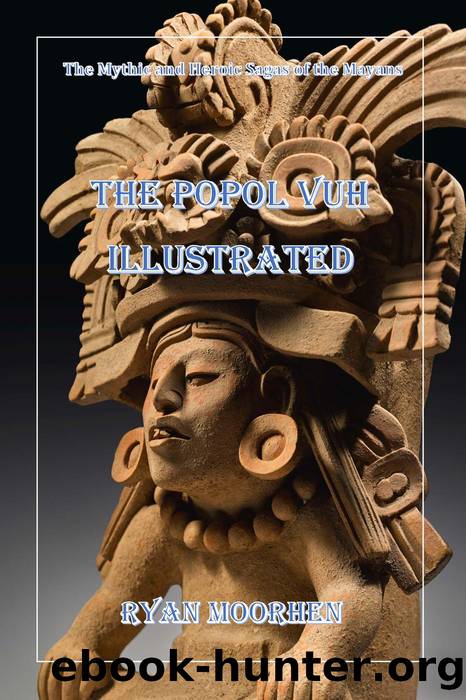The Popol Vuh Illustrated by RYAN MOORHEN

Author:RYAN MOORHEN
Language: eng
Format: epub
Tags: MEXICO, MESOAMERICA, CENTRAL AMERICA, MAYAN, MAYA, AZTEC, NEW WORLD
Publisher: DTTV PUBLICATIONS
Published: 2021-03-10T00:00:00+00:00
CHAPTER SIX â EVIDENCE OF METRICAL COMPOSITION
There is not wanting evidence to show that, like most barbarous compositions which depended for their popularity upon the ease with which they could be memorized, the "Popol Vuh" was originally composed in a meter. Passages here and there show a decided metrical tendency, as:
"Is the dawn about to be?
Yes, answered the older man.
Then he spread apart his legs.
Again the darkness appeared.
Four times the older adult spread his legs.
Now the opossum spreads his legs"â
Say the people
The first line almost scans in iambics (English style), and the fifth is perfect, except for the truncation in the fourth foot. The others appear to us to consist of that alternation of sustained feetâmusically represented by a semibreveâwith pyrrhics, which is characteristic of nearly all savage dance-poetry. Father Coto, a missionary, observes that the natives were fond of telling long stories and of repeating chants, keeping time to them in those dances of which all the American aboriginal peoples appear to have been so fondâand still are, as Baron Nordenskjöld has recently discovered in the Aymara country. These chants were called gum tzih, or "garlands of words," and although the native compiler of the "Popol Vuh" appears to have been unable to recollect the precise rhythm of the whole, many passages attest its original odic character.
The pronunciation of x in Kiché equals sh. Ch is pronounced hard, as in the Scottish "loch," and c hard, like k.
The various works which contain notices of the "Popol Vuh" and the kindred questions of Mayan and Kiché mythology are so difficult of access to the majority of readers that it has been thought best to divide them into two classes:
(1) those which can be more or less readily purchased, and which are, naturally, of more recent origin; and
(2) those which are not easy to come by, and which, generally speaking, are the work of Spanish priests and colonists of the sixteenth, seventeenth, and eighteenth centuries.
The work on the subject which is most easily obtained, and indeed the only work which gives the original Kiché text, is that of the Abbé Brasseur de Bourbourg, âVuh Popol: Le livre sacré de Quichés et les mythes de lâantiquité Américaine.â The assistance of natives translated the Kiché text into French, and the translation is more or less inaccurate. The student with the greatest caution must read the notes and introduction. It was published in Paris in 1861.
Ximenes' translation into Spanish of the "Popol Vuh" and Gavarrete are about equal value, rather inaccurate, and accompanied by scanty notes. The title of the first is âLas Historias del Origin de los Indios de Guatemala, par el R. P. F. Francisco Ximenes (Vienna, 1856), and of the second, âEl Popol Vuh,â (San Salvador [58]1905). This exhausts the list of works written exclusively concerning the "Popol Vuh." The other works of Brasseur and those of Brinton contain more or less numerous allusions to it, but references to it in standard works of mythology are exceedingly rare. The only other
Download
This site does not store any files on its server. We only index and link to content provided by other sites. Please contact the content providers to delete copyright contents if any and email us, we'll remove relevant links or contents immediately.
The Daily Stoic by Holiday Ryan & Hanselman Stephen(3325)
The Fate of Rome: Climate, Disease, and the End of an Empire (The Princeton History of the Ancient World) by Kyle Harper(3067)
People of the Earth: An Introduction to World Prehistory by Dr. Brian Fagan & Nadia Durrani(2739)
Ancient Worlds by Michael Scott(2691)
Babylon's Ark by Lawrence Anthony(2683)
The Daily Stoic by Ryan Holiday & Stephen Hanselman(2580)
Foreign Devils on the Silk Road: The Search for the Lost Treasures of Central Asia by Peter Hopkirk(2467)
India's Ancient Past by R.S. Sharma(2457)
MOSES THE EGYPTIAN by Jan Assmann(2418)
The Complete Dead Sea Scrolls in English (7th Edition) (Penguin Classics) by Geza Vermes(2284)
The Earth Chronicles Handbook by Zecharia Sitchin(2233)
Lost Technologies of Ancient Egypt by Christopher Dunn(2226)
24 Hours in Ancient Rome by Philip Matyszak(2086)
Alexander the Great by Philip Freeman(2066)
Aztec by Gary Jennings(2032)
The Nine Waves of Creation by Carl Johan Calleman(1919)
Curse Tablets and Binding Spells from the Ancient World by Gager John G.;(1863)
Before Atlantis by Frank Joseph(1858)
Earthmare: The Lost Book of Wars by Cergat(1825)
